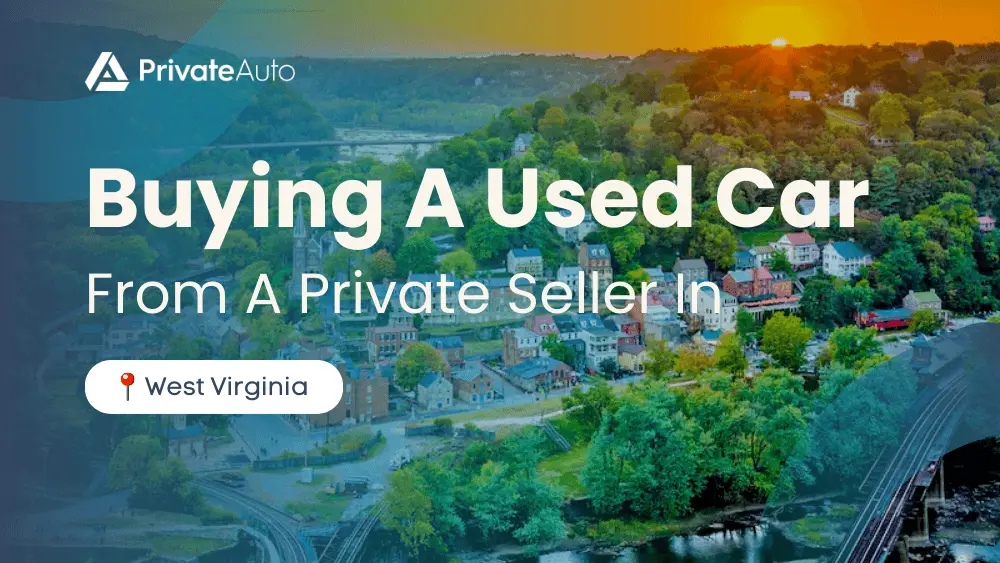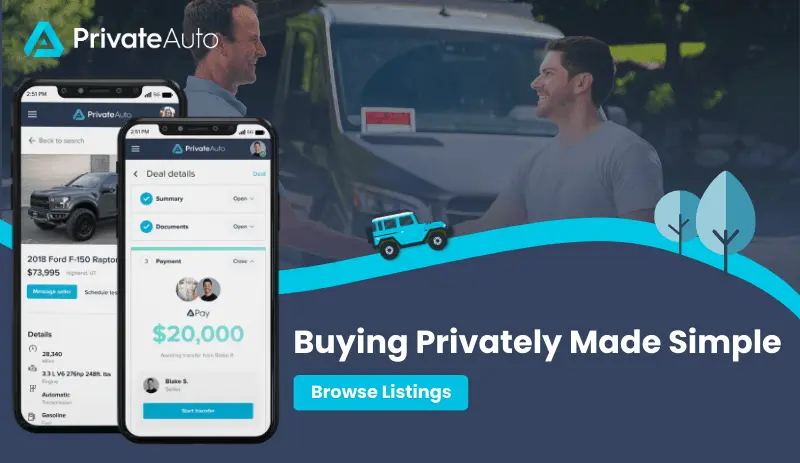Steps to Buying a Used Car in West Virginia
1. Find a car to buy
2. Take the car for a test drive
3. Handle paperwork
4. Pay the seller
5. Transfer ownership
6. Register the car
7. Get a new license plate
Let’s go over this process in more detail.

Is Buying from a Dealer Better than Buying from a Private Seller?
Here at PrivateAuto, we’re big fans of going the private seller route. Here are the advantages:
1. Avoid fees. Car dealers charge documentation fees that range from $50 to over $1,000.
2. Get a better price by cutting out the middleman and going to the source. Dealers must buy low and sell high to make a spread and keep the lights on.
3. You drive the deal on your terms: PrivateAuto allows you to make offers and negotiate the best deal directly with the seller.
4. In some states, buying from a private seller means no sales tax. For example, Arizona, Hawaii, and Nevada charge sales taxes on retail (dealership) auto purchases, but not private-party ones.
We think you should be able to complete a private-party transaction as easily as you could buy a used car from a dealership. PrivateAuto’s tech-enabled solutions make this possible.
Find a car
Find a Car
Here are your options for finding the best private-party used car for you:
- Social media listings (e.g., cars for sale on Facebook Marketplace).
- Vehicle listing sites such as Cargurus.
- Online classifieds
b. National classifieds such as Craigslist and OfferUp.
- Auction websites such as Bring a Trailer and eBay Motors.
While these can be great resources for finding that perfect Range Rover, they fall short when it comes time for the transaction. That’s why we call them “meetingplaces” instead of true marketplaces.
We are the only transactional marketplace that offers self-serve technology solutions for every part of the deal. If you’d like to see how easy buying privately can be, shop our used vehicles for sale and get the process started.
We don’t hate other listing sites. Some of them have more private-party car inventory than we do (we’re still new and gaining traction). But we still want you to have the transactional security and convenience that our users enjoy.
That’s why DealNow was created, a fast-track dealflow that allows you to start a deal on another platform and finish it with our transactional infrastructure.
Get your deal started now!
Agree on a price
Negotiate the Price
PrivateAuto lets you make an offer with the click of a button. The seller can then accept, reject, or counteroffer. No awkward messaging back and forth.
Do Some Research on the Car
Get a Vehicle History Report
We include a vehicle history report for all premium listings.
Here are some reasons a vehicle history report gives you peace of mind.
1. You know how well the car has been cared for.
2. You have visibility into any accidents or insurance claims.
3. You can see service records, major repairs, and other work.
Research the Title
You can use the National Insurance Crime Bureau website to research the title of a vehicle to protect yourself from fraud.
It doesn’t happen often, but sometimes sellers will attempt to mislead or outright deceive. For instance, they may try to pass off a salvage title as a clean title.
Good title research will help you check for the following:
1. Reports of the car having been stolen.
2. The car has been declared a total loss in an insurance claim.
3. An outstanding lien (or lien release).
Simply ask the seller for their full name and the vehicle identification number (VIN) in advance of meeting up. Run the title check, and have one less thing to worry about.
Take the car for a test drive
Test Drive
1. Our handy in-app scheduler allows you to pick from the time slots the seller has selected. No back-and-forth conversations. You’ll also see the seller’s preferred meetup location.
2. You can also choose to deal only with verified sellers, which helps to weed out bad actors who prefer to operate in the shadows.
Handle paperwork
Documentation
Here are the key documents involved in a private-party vehicle transaction in the state of West Virginia.
1. Title certificate
2. Bill of sale
West Virginia Certificate of Title
- Odometer disclosure statement that lists the current mileage
- Seller’s hand-printed name, signature, and address (if there is more than one seller listed on the title, all sellers will need to sign)
- Date of sale
- Purchase price
- Your hand-printed name and signature
- The signature of the lien holder, if there’s a current loan on the car
West Virginia Bill of Sale
PrivateAuto streamlines the bill of sale by having both parties electronically sign an official West Virginia bill of sale in our mobile app printing or scanning is needed. Everything is stored in your PrivateAuto account as a reference, should you ever need it.
Pay the seller
Transfer ownership
Register the car
Get new license plates
Pay for the Car
We got tired of the limitations associated with existing payment methods, so we created PrivateAuto Pay. Here’s how it works:
1. No transfer fees.
2. No exchange of contact or banking info.
3. Works 24 hours a day, 365 days a year. No coordinating around banker’s hours.
4. Instantaneous transfers. Close the deal when you meet for the test drive.
5. Enjoy escrow-like safeguards without the expense and hassle of an actual escrow service.
You’ll never want to buy a car any other way.
West Virginia Vehicle Title Transfer and Registration
Here’s what you’ll need to provide when you visit your local DMV office:
- The Certificate of Title, signed over to you by the previous owner
- A completed Application for Certificate of Title (Form DMV-1-TR)
- A notarized bill of sale
- Lien information (if applicable)
- Payment for the West Virginia sales tax: 6% of vehicle purchase price
- Payment for West Virginia’s vehicle title transfer fee: $15
- Payment for West Virginia vehicle registration fees: $51.50
- Payment for any municipal fees that apply based on location
- Valid driver’s license
- Proof of insurance coverage—your insurance company can provide
Read our complete guide to a West Virginia title transfer for more info on the subject.
West Virginia Vehicle FAQ
Does West Virginia have a sales tax on cars?
West Virginia sales tax is 6% of the vehicle purchase price. Unlike many other states, West Virginia doesn’t have local sales taxes; 6% is the most you’ll pay.
Does a West Virginia title need to be notarized?
The title needs to be notarized only when purchasing a vehicle from a private seller and the purchase price is 50% of the current NADA Clean Loan Book value.
How much is a standard license plate in West Virginia?
n West Virginia, the standard passenger vehicle plate cost is included in the vehicle registration price.
You’ll receive the classic blue and gold “Wild Wonderful” plates when:
– Registering a vehicle in your name
– Replacing lost, damaged, or stolen license plates
– Trading down from specialty plates for standard plates
What is the DMV-5-TR form used for?
The affidavit of transfer of ownership without consideration (Form DMV-5-TR), is a form used in West Virginia to transfer the ownership of a vehicle without any consideration.
Here are some of the situations where you may need to use the ownership without consideration form:
– You are giving a vehicle to a family member or friend as a gift.
– You are trading in a vehicle for a new one.
– You are donating a vehicle to a charity.
How much is the West Virginia biennial registration fee?
West Virginia provides passenger vehicle owners a choice between annual and biennial (every 2 years) registration renewal. Biennial registration (valid for 2 years) costs $102.
Does West Virginia require emissions testing?
The state of West Virginia does not require emissions testing.
How can I request a duplicate vehicle title in West Virginia?
In West Virginia, if the seller lost, misplaced, or damaged your car title, the seller will need to take these steps to replace it:
– Completed affidavit of duplicate title for a vehicle or watercraft (Form DMV-4-TR)
– A copy of your valid driver’s license
– Payment for the duplicate vehicle title fee: $10
How much is a West Virginia duplicate license plate?
If you need to replace a lost, damaged, or stolen license plate in West Virginia, you can request a duplicate plate through the DMV.
The fees for a duplicate passenger vehicle plate are:
1. $10.50 for a single plate ($10 fee + $0.50 reflectorization fee)
2. $10.00 for a replacement license plate decal
So if you just need one replacement plate, it costs $10.50. If you need a whole new set of front and rear plates, the fee is $21 total through the West Virginia DMV.
Further Reading
What are the most common escrow scams?
What is the best place to buy a car online?
What fees are there when buying a used car?
How to pay for a car in cash on a weekend?
Questions to ask when buying a car
How long does it take to get plates in the mail?
What are the cheapest ways of buying a car?

Dana Marchlowitz
Contributing Author
Dana is a seasoned executive with a strong background in startups and product management. Currently serving as the Chief Product Officer for PrivateAuto, Dana brings a wealth of knowledge and expertise to the role….

